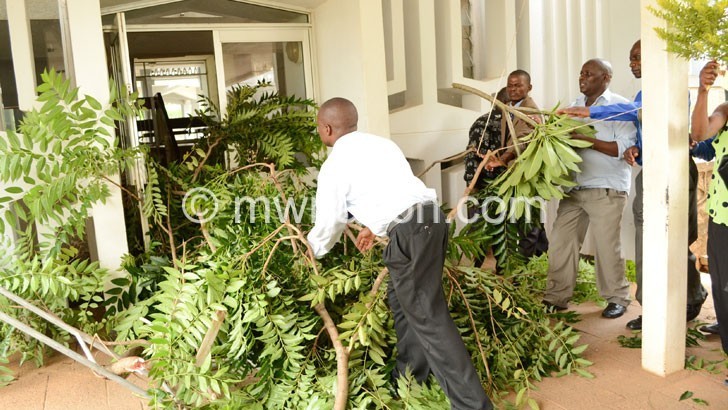Government opens Pandora’s Box
Whatever reason the Mutharika administration had for promoting 20 000 teachers and 7 000 police officers weeks before elections, has opened a Pandora’s box.
Now, other civil servants want higher pay grades too, a demand—if effected—could dig an even bigger hole in the national budget whose wage bill the World Bank and the International Monetary Fund (IMF) have already judged to be unsustainable.

Yesterday, Finance, Economic Planning and Development Minister Goodall Gondwe said government cannot afford the demands by the Civil Servants Trade Union (CSTU) that government promotes long serving and self-upgraded mainstream civil servants.
At K391 billion, the wage bill is around 28 percent of the K1.4 trillion revised budget for the current financial year.
That proportion worsens to over 35 percent when compared with the recurrent budget—where personal emoluments fall. The recurrent account provides money for running ministries, departments and agencies (MDAs).
As the situation stands, it means for every K100 allocated to run MDAs, K35 is used to pay civil servants, leaving little fiscal space.
But with government having exposed its soft underbelly through the unplanned promotions of teachers and police officers, CSTU is unlikely to be understanding.
The union has since given government a 14-day ultimatum to implement the appeal or face a strike likely to come days before voters cast their ballots.
In a statement dated April 29 2019 and co-signed by CSTU president Joseph Mdambo and general secretary Madalitso Njolomole, the union said there are many civil servants who have served in one position for at least 10 years and some who have upgraded their qualifications, but have not been promoted.
The union has accused government of effecting “segregative promotions” and used the same as a basis for demanding promotions in the mainstream civil service.
Reads the statement: “In view of this development, CSTU wishes the government to note that some civil servants upgraded themselves with diploma, degrees and master’s degrees while others have been on the same grade for more than 10 years.
“CSTU, therefore, demands government to use the same criteria and methodology which applied to promoting fellow workers in teaching and police services.”
In an interview yesterday, Njolomole said civil servants deserve equal treatment. He said it was ironic that the same government which indicated last year that it would not promote any civil servant due to lack of funds, was effecting mass promotions of teachers and police officers.
“We have handed an official letter to the Chief Secretary. The civil service is not an animal farm. We are all equal and deserve equal treatment”, he said.
There are about 110 000 workers in the mainstream civil service, but CSTU said it was yet to establish the number of those deserving promotions.
The demand puts government in a tight spot as CSTU says it believes government has the capacity to absorb more civil servants on higher grades following the recent promotions of police officers and secondary and primary school teachers.
Implementing the demands would plunge the wage bill to unsustainable levels and threaten the successful implementation of the Extended Credit Facility (ECF) programme with the International Monetary Fund (IMF).
In an interview yesterday, Gondwe feared that government would end up effecting a general salary increase if civil servants too can be promoted at a time when K25 billion has been cut from the 2018/2019 National Budget that expires on June 30.
The minister said the ultimatum is not feasible; hence, President Peter Mutharika’s administration will not act on it, especially considering that the position was earlier made clear.
Said Gondwe: “You don’t demand promotions. That will no longer be a promotion, but a general salary increase. Everybody needs to be promoted and in the end we will have a general salary increase.
“If police officers, teachers and civil servants are promoted that is no longer a promotion. It is a general salary increase. We cannot afford it.”
But Njolomole argued that government decided to promote teachers and police officers despite its earlier commitment not to promote any civil servant due to financial constraints.
Under the Malawi Public Service Regulations (MPSR), “a civil servant shall be eligible for promotion after he or she has served in his or her substantive post for a period of not less than four years”.
Meanwhile, political and social commentator Humphrey Mvula said government has found itself in the situation due to its weakness in using the election campaign period to effect promotions. In this regard, he said the demand from CSTU is not surprising.
He said: “The challenge has been created by government itself because leadership has demonstrated that it is segregative in distribution of promotions.”
Mustafa Hussein, a political scientist based at the University of Malawi’s Chancellor College, also faulted government for effecting promotions without following rules and regulations stipulated in the MPSR, which among others, demand that promotions in government should be effected based on satisfactory performance.
He said: “What this means is that civil servants are being reactive to the developments within the public service because of promotions done somewhere else. They are aware that some promotions are politically-motivated and they want to take advantage of that.”
Recently, government also raised chiefs’ honaria, but they got their increase, including arrears this month, a few weeks away from polls.
Teachers and police officers are the key stakeholders in the electoral process. Teachers are usually used as polling officers while police officers provide security. Their promotions have come at a time when the highly contentious tripartite elections are around the corner.





